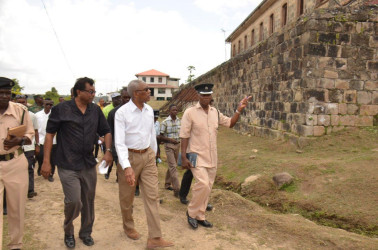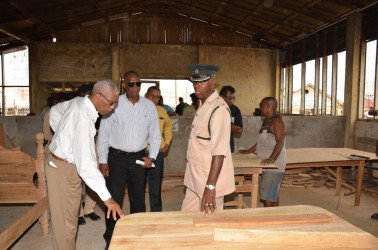President David Granger, accompanied by Minister of Public Security, Khemraj Ramjattan and Minister of State, Joseph Harmon, yesterday visited the Mazaruni Penal Settlement as part of government’s search for a long-term solution to the problems of the prison service which saw 17 inmates dying on Thursday in a fire at the Camp Street facility.
A statement from the Ministry of the Presidency said that Regional Chairman, Gordon Bradford and Commander of the Police `F’ Division, Ravindradat Budhram also joined the President at a meeting with staff of the institution and on a tour of the facility. The statement said that the team surveyed the infrastructure of the settlement, including the maximum security area.

Granger referred to the visit as an important fact finding and problem solving one and assured the staff and officials present at a briefing meeting that problems within the Guyana Prison Service will be “resolved within the limit of the country’s resources and to the best of the Government’s ability.”
Referring to Guyana’s worst prison riot in history on Thursday, the President noted that the prison service has had problems that are endemic that must be rectified. “Our presence here is not just a gut reaction. It is a plan to ensure that there is a long term strategy. We are ensuring that the Guyana Prison Service fulfills its mandate. We have to build a system in which persons who enter this service as inmates would have the best opportunities for rehabilitation and those who are incorrigible… would be prevented from bringing harm to society,” the President said.
Granger said that if these changes had been made over time, then the tragedy that occurred in Georgetown, may not have happened.

“What occurred in Georgetown ought not to have occurred had improvements been introduced to the Guyana Prison Service over a period of time… Some of the measures, which could have corrected or could have prevented the events of last week were not implemented”, he declared. The statement said that upon his arrival at the 173-year-old penitentiary, Granger was given a comprehensive briefing by Officer in Charge (OC), Alexander Hopkinson on the workings of the facility as well as the administrative and other challenges that are being faced on a daily basis.
The statement said that prison officers and other administrative staff were also given the opportunity to air their concerns with the President and the Ministers.
The statement added that Granger assured the staff that the Government will do its utmost to ensure that their issues, particularly those that relate to their personal welfare and that of their families, are addressed.
At present, the prison houses 289 inmates, 24 of whom are high-profile criminals. On the other hand, the statement said that the required staff complement is 95, but the facility only has 54 on staff currently. Hopkinson said that they are looking to increase their staff strength in order to increase capacity. However, accommodation and other arrangements have to be addressed before that can happen.





